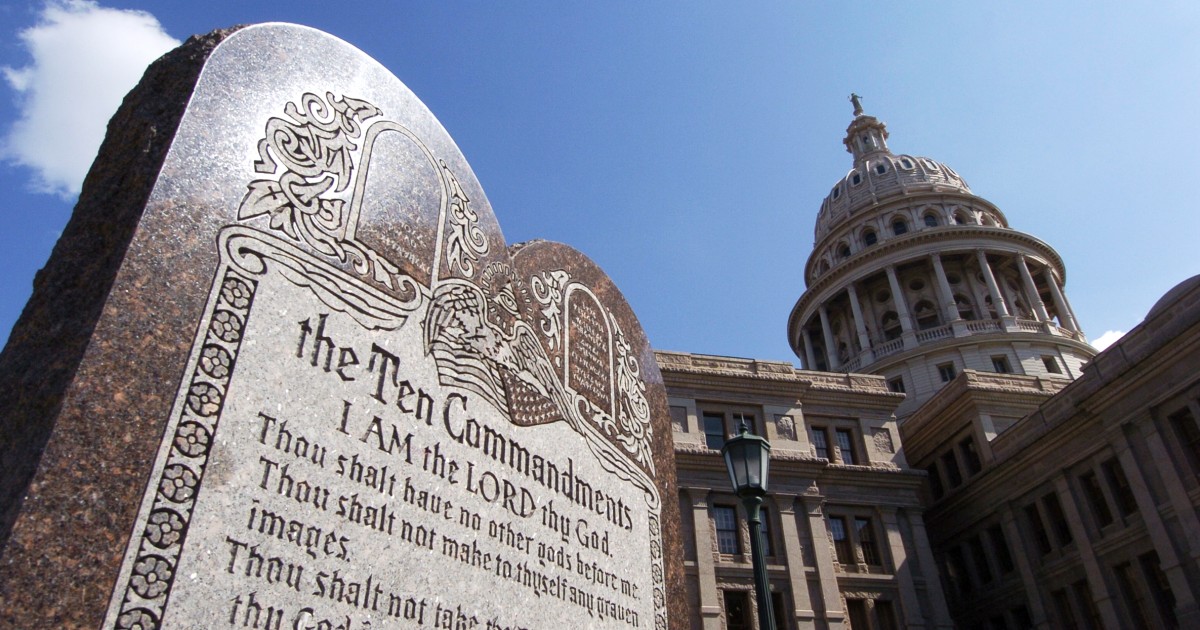The draft law that requires the ten commandments to be published in every semester in public schools in Texas, has cleared a major legislative obstacle on Sunday and is preparing to go to the ruler of Gregbot for approval.
The state parliament in the state issued a copy of the ten-command bill in a vote 82-46 after a week of discussion and delay, when Democratic lawmakers tried to make amendments. These amendments were voted, including allowing individual educational areas to choose the ten commandments in different languages, by a majority of the Republic.
Abbot’s office did not immediately comment on his approval, but the Republican ruler is It is expected to sign up He – she In the law after the Senate approved its copy of the legislation in March, the 11-11 vote.
Lieutenant ruler and Patrick He previously said The success of the bill, Known as SB 10He was among his priorities for the current session, which ends next month, after similar legislation failed in 2023 due to time restrictions.
“By placing the ten commandments in the classroom in our public schools, we guarantee that our students receive the same institutional moral compass, such as the ancestors of our state and our country,” Patrick said.
However, it is possible that the legislation of the ten commandments in Texas will face constitutional opposition, as happened in Louisiana, where the Republican Party’s fishing law was signed last year by state governor Jeff Landre and soon faced by a coalition of various religious beliefs.
Under the Texas invoice, all elementary or secondary schools must “show a clear view of each school classroom or a tenth edition of the ten wills.” The display of screens should be at least 16 inches and 20 inches, and includes the text of the ten commandments as it is written on the bill.
Once the law is logged in, schools must “accept any offer of offers that are donated from the private sector” or may use boycott funds, starting from the 2025-26 academic year.
The legislation does not have an enforcement mechanism, and it is not clear what may happen to schools or individual teachers who refuse to comply. According to the analysis of the House of Representatives Committee, the draft law itself “does not explicitly create a criminal crime.”
Senator Phil King, the main author of the draft law, said that he presents legislation because “the ten wills are part of our story in Texas and American.”
But Representative James Talarico, a Christian democracy, objected to the draft law this week during a previous vote, saying that the presentation of this religious text may feel excluded for non -Christian students.
Talarico said: “Forcing our religion on their throat is not love.”
With Louisiana and The last of which is Arkansas The ten will in public schools impose legal arguments on such laws again before the US Supreme Court, which in 1980 ruled that the classroom presentations of the ten wills are unconstitutional.
Louisiana has not fully implemented its law, as officials await the ruling of the Federal Appeal Court for its constitutionality. In November, the judge of the minimum court concluded that the state did not provide “any constitutional method to display the ten commandments.”
At the same time, the legislators in Texas approved on Friday over another religiousNThe existing bill This would allow educational areas to adopt policies that allow a period of prayer and the reading of the Bible or another “religious text” with the consent of the parents. It is also expected that Abbut will fall into the law.
Emily Watt, a spokeswoman for the Texas Freedom Network, a popular group calling for religious freedom, said that the wave of conservative legislation in Texas and other countries is part of a broader “coordinated strategy” to stir Bible in public education.
“The message that this sends to the children is to be told that their religion does not matter and is not important like this,” Witts said. “We are concerned that it will lead to bullying and others – all things in public schools we are trying to prevent.”


